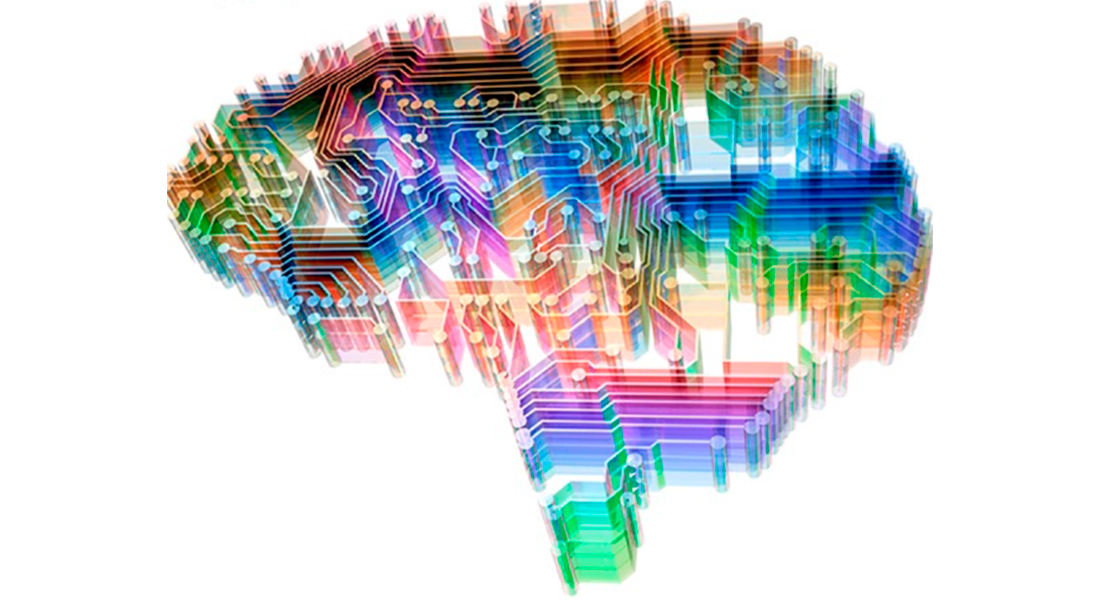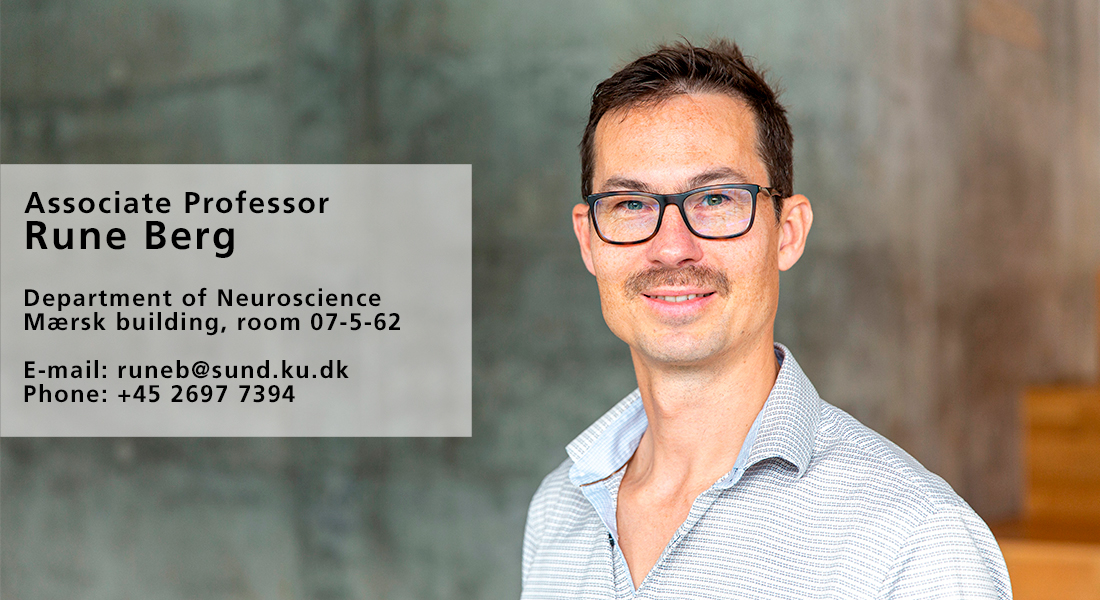Berg Lab
The research focus of the Berg lab has been to combine quantitative approaches of mathematics and physics with experiments using electrophysiology, genetics, tissue clearing and other biological tools to better understand the nervous system especially the motor system.
The research focus of the Berg lab has been to combine quantitative approaches of mathematics and physics with experiments using electrophysiology, genetics, tissue clearing and other biological tools to better understand the nervous system especially the motor system.
The Berg group put emphasis on strong quantitative approaches in neuroscience. In particular, we believe investigating populations of neurons, networks, as opposed to the single-neuron tradition, is crucial. In turn, this will likely spur therapeutic strategies for individuals with neurological conditions, especially spinal cord injuries. Our key research areas are:
- Neuronal Population activity in the spinal cord and brain using large array electrophysiology.
- Development of novel probe technology
- Classification of network architecture in motor circuits.
- Histological clearing techniques for large sample imaging for network reconstruction
- In vivo, awake electrophysiology with chronic implantation of electrodes and optical fibers in the central nervous system.
Technological achievements
Designed the Berg64-probe now sold at Neuronexus, http://neuronexus.com/
-
H Lindén, PC Petersen, M Vestergaard, RW Berg “Movement is governed by rotational neural dynamics in spinal motor networks”, Nature 610 (7932), 526-531 (2022) (DOI)
-
M Radosevic, A Willumsen, PC Petersen, H Lindén, M Vestergaard, RW Berg, "Decoupling of timescales reveals sparse convergent CPG network in the adult spinal cord" Nature Communications, 10:2937, 2019 (Link) (Video abstract)
- RW Berg, A Willumsen, H Lindén "When networks walk a fine line: Balance of excitation and inhibition in spinal motor circuits" Current Opinion in Physiology, 8: 76-86, 2019 (Link)
- Front Neural Circuits, 11: 103, 2017Jensen, KHR, and Berg RW "Advances and perspectives in tissue clearing using CLARITY", J. Chemical Neuroanatomy, 86: 19-34, 2017
- Jensen, KHR, RW Berg "CLARITY-compatible lipophilic dyes for electrode marking and neuronal tracing" Scientific Reports, 6:32674, 2016
- Petersen, PC and RW Berg (2016) Lognormal firing rate distribution reveals prominent fluctuation-driven regime in spinal motor networks eLife; 10.7554/eLife.
- Vestergaard, M and RW Berg "Divisive gain modulation of motoneurons by inhibition optimizes muscular control" J. Neuroscience 35(8):3711-3723, 2015
- Petersen, PC, M Vestergaard, KHR Jensen, and RW Berg "Premotor spinal network with balanced excitation and inhibition during motor patterns has high resilience to structural division" J. Neuroscience 34(8):2774–2784, 2014
- R. W. Berg, A. Alaburda and J. Hounsgaard (2007) Balanced inhibition and excitation drives spike activity in spinal half-center" Science, vol. 315(5810) 390-393.
Awake, behaving rodents, as well as anesthetized and in vitro preparations, are used as a part of our ongoing research.
Our technical expertise includes:
- intracellular recording
- in vivo multisite extracellular recording
- design and fabrication of micro electrode arrays
- juxtacellular staining with paraformaldehyde fixable lipophilic dyes
- intracortical electrical, pharmacological, and optical (optogenetic) microstimulation
- brain bow labeling
- viral expression and tracing
- 3D histology including tissue clearing and immunochemistry analytical and numerical methods for data analysis
- single cell and network modeling
- synaptic conductance estimation
- simple behavioral test by rodents
- treadmill locomotion
- video monitoring and analysis of animal behaviors
41) Kunyang Sui, Marcello Meneghetti, Rune W. Berg, Christos Markos, “Optoelectronic and mechanical properties of microstructured polymer optical fiber neural probes” Optics Express, In Press, 2023
40) Marcello Meneghetti, J. Kaur, K. Sui, J.F. Sørensen, R. W. Berg, C. Markos “Soft monolithic infrared neural interface for simultaneous neurostimulation and electrophysiology” Light: Science and applications, 12:127 2023 (DOI)(PDF)
39) Kunyang Sui, M. Meneghetti, J. Kaur, R.J.F. Sørensen, R. W. Berg, C. Markos “Drug delivery and optical neuromodulation using a structured polymer optical fiber with ultra-high NA” Proc. SPIE 12366, Optogenetics 2023 (DOI)
38) Marcello Meneghetti, K. Sui, J. Kaur, J.F. Sørensen, R. W. Berg, C. Markos “Infrared neural stimulation and electrophysiology in a soft fiber-based neural interface” Proc. SPIE 12366, Optogenetics and Optical Manipulations 2023, 1236605 (DOI)
37) Henrik Lindén, P.C. Petersen, M. Vestergaard, Rune W. Berg “Movement is governed by rotational neural dynamics in spinal motor networks”, Nature 610 (7932), 526-531 (2022) (DOI)(Sharedit link). BSG-model code (Github). Supplementary Videos (Movie S1) (Movie S2) (Movie S3). Supplementary Information (Link). Peer review report (Link). Read the associated “News and Views” by Martha W. Bagnall: “Neurons that control walking go round in circles” (DOI).
36) Jaspreet Kaur and Rune W. Berg “Viral Strategies for Targeting Spinal Neuronal Subtypes in Adult Wild-Type Rodents” Scientific Reports, 12: 8627 (Link) (PDF)
35) Renfei Liu, Francois Bernard Lauze, Kenny Erleben, Rune W. Berg, and Sune Darkner “Bundle Geodesic Convolutional Neural Network for diffusion-weighted imaging Segmentation”, J. Med. Imag. 9(6) 064002 (Link)
34) Marcello Meneghetti, K. Sui, J. Kaur, J. F. Sørensen, R. W. Berg, C. Markos, “Novel soft optrodes for infrared neuromodulation” Biophotonics Congress: Biomedical Optics 2022 (Link)
33) Kunyang Sui, Marcello Meneghetti, Jaspreet Kaur, Jakob Fleng Sørensen, Rune W. Berg and Christos Markos “Adaptive polymer fiber neural device for drug delivery and enlarged illumination angle for neuromodulation” Journal of Neural Engineering, 19 016035 (Link)
32) Henrik Lindén and Rune W. Berg “Why firing rate distributions are important for understanding spinal central pattern generators”, Front. Hum. Neurosci. 15: 719388, 2021 (Link) (Python code)
31) Simon Henmar, Erik B. Simonsen, Rune W. Berg “What are the gray and white matter volumes of the human spinal cord?” 124: 1792-1797, J. Neurophysiol 2020 (Link) (Data set DOI)
30) Berg, RW “The Turtle as a model for spinal motor circuits” in Whelan PJ and Sharples SA (Eds). “The Neural Control of Movement: Model Systems and Tools for Examining Locomotor Function”, San Diego: Elsevier inc./ Academic press, 2020: 205-219. (Link)
29) M Radosevic, A Willumsen, PC Petersen, H Lindén, M Vestergaard, RW Berg, "Decoupling of timescales reveals sparse convergent CPG network in the adult spinal cord" Nature Communications, 10:2937, 2019 (Video abstract)
28) RW Berg, A Willumsen, H Lindén "When networks walk a fine line: Balance of excitation and inhibition in spinal motor circuits" Current Opinion in Physiology, 8: 76-86, 2019
27) RW Berg "Commentary: Synaptic excitation in spinal motoneurons alternates with synaptic inhibition and is balanced by outward rectification during rhythmic motor network activity" Front Neural Circuits,12:1, 2018.
26) Perrier, J-F, HB Rasmussen, RW Berg "Intense activity of the raphe spinal pathway depresses motor activity via a serotonin dependent mechanism" Front Neural Circuits, 11:111, 2018.
25) RW Berg "Neuronal diversity in spinal motor circuits: The whole is greater than sum of its parts" Front Neural Circuits, 11: 103, 2017.
24) Jensen, KHR, and Berg RW "Advances and perspectives in tissue clearing using CLARITY", J. Chemical Neuroanatomy, 86: 19-34, 2017.
23) Vich, C, RW Berg, S Ditlevsen, A Guillamon "Estimation of synaptic conductances in presence of nonlinear effects caused by subthreshold ionic currents" Front. Comput. Neurosci. 11:69, 2017.
22) Petersen, PC, and RW Berg "Spinal cord preparation from adult red-eared turtles for electrophysiological recordings during motor activity" Bio-protocol 7(13), e2381, 2017.
21) Berg, RW, MT Stauning, JB Sorensen, H Jahnsen "Comment on 'Penetration of action potentials during collision in the median and lateral giant axons of invertebrates'" Physical Review X, 7 028001 2017.
20) Petersen, PC and RW Berg "Lognormal firing rate distribution reveals prominent fluctuation-driven regime in spinal motor networks" eLife 2016; 10.7554/eLife.18805.
19) Jensen, KHR, RW Berg "CLARITY-compatible lipophilic dyes for electrode marking and neuronal tracing" Scientific Reports, 6:32674, 2016
18) Vestergaard M, RW Berg, “Divisive Gain Modulation of Motoneurons by Inhibition Optimizes Muscular Control” J. Neuroscience, 35(8): 3711-3723, 2015
17) Petersen PC, M Vestergaard, KHR Jensen, RW Berg, “Premotor spinal network with balanced excitation and inhibition during motor patterns has high resilience to structural division” J. Neuroscience, 34(8): 2774-2784, 2014
16) Berg RW and Ditlevsen S, "Synaptic inhibition and excitation estimated via the time constant of membrane potential fluctuations" J. Neurophysiol. 110: 1021-1034, 2013
15) Kolind J, Hounsgaard J and Berg RW "Opposing effects of intrinsic conductance and correlated synaptic input on Vm-fluctuations during network activity" Front. Comput. Neurosci. 6:40, 2012.
14) Jahn P, Berg RW, Hounsgaard J, Ditlevsen S. "Motoneuron membrane potentials follow a time inhomogeneous jump diffusion process" J. Comput Neurosci. 2011; 31(3): 563-79
13) S. Walloe, U. V. Nissen, RW Berg, J. Hounsgaard, B. Pakkenberg "Stereological estimate of the number of neurons and glial cells in the spinal segment D9 of the red-eared turtle" J. Neuroscience, 31, 2431-2435, 2011.
12) J. Dreyer, K. Herrik, RW Berg, and J. Hounsgaard "Influence of phasic and tonic dopamine release on uptake and receptors" J. Neuroscience 30, 14273-14283, 2010.
11) R.W. Berg, Chen MT, Huang HC, Hsiao MC, Cheng H (2009) A method for unit recording in the lumbar spinal cord during locomotion of the conscious adult rat. J Neurosci Methods 182:49-54.
10) R. W. Berg and J. Hounsgaard. "Signaling in large-scale networks” Cogn Process, 10, s9-s15, 2009.
9) R. W. Berg, S. Ditlevsen, and J. Hounsgaard. "Intense synaptic activity enhances temporal resolution in spinal motoneurons” PLoS ONE 3(9): e3218, 2008.
8) R. W. Berg, A. Alaburda, and J. Hounsgaard. "Balanced inhibition and excitation drive spike activity in spinal half-centers” Science 315: 390-393. 2007.
7) R. W. Berg, D. Whitmer, and D. Kleinfeld. "Exploratory whisking by rat is not phase-locked to the hippocampal theta rhythm" J. Neuroscience, 26(24): 6518-6522, 2006.
6) R. W. Berg, B. Friedman, L. F. Schroeder and D. Kleinfeld. "Activation of nucleus basalis facilitates cortical control of a brainstem motor program." J. Neurophysiology 94: 699-711, 2005.
5) R.W. Berg and D. Kleinfeld, "Vibrissa movement elicited by rhythmic electrical microstimulation to motor cortex in the awake and aroused rat mimics exploratory whisking", J. Neurophysiol. 90: 2950-2963, 2003.
4) R. N. S. Sachdev, R. W. Berg, G. Champney, D. Kleinfeld, F. F. Ebner, "Unilateral vibrissa contact: changes in amplitude but not timing of rhythmic whisking", Somatosensory & Motor Research, 20(2): 163 - 169, 2003.
3) R.W. Berg and D. Kleinfeld, "Rhythmic whisking by Rat: Retraction as well as protraction of the vibrissae is under active muscular control", J. Neurophysiol. 89: 104-117, 2003.
2) S.M. O'Connor, R.W. Berg and D. Kleinfeld, "Coherent electrical activity between vibrissa sensory areas of cerebellum and neocortex is enhanced during free whisking", J. Neurophysiol. 87: 2137-2148, 2002.
1) D. Kleinfeld, R.W. Berg, S.M. O'Connor, "Anatomical loops and their electrical dynamics in relation to whisking by rat", Somatosensory and motor research 1999; 16(2): 69-88.
Developing a theory on how brains work
 Neuroscience does not have, as physics does, a standard model that serves as a conceptual structure in which gaps of knowledge and inconsistencies can be isolated and serve as impetus for experiments, technological improvements or elaborate calculations. The purpose of this project is to produce conceptual frameworks that could develop into a “standard model of the functions of mammalian brains”. The project will try to identify the gaps in our experimental knowledge of brain dynamics at all scales of observation and bridge them by plausible hypotheses. The strategy is to identify crucial questions for brain science and produce experimentally testable hypotheses as parts of overriding conceptual, biophysical, molecular and to some extent mathematical framework.
Neuroscience does not have, as physics does, a standard model that serves as a conceptual structure in which gaps of knowledge and inconsistencies can be isolated and serve as impetus for experiments, technological improvements or elaborate calculations. The purpose of this project is to produce conceptual frameworks that could develop into a “standard model of the functions of mammalian brains”. The project will try to identify the gaps in our experimental knowledge of brain dynamics at all scales of observation and bridge them by plausible hypotheses. The strategy is to identify crucial questions for brain science and produce experimentally testable hypotheses as parts of overriding conceptual, biophysical, molecular and to some extent mathematical framework.
Workshop Activities
How does the brain work? September 2016. Summary in Neuron 94:933-1039, 2017.
Can there be a theory of the brain? May 2019. Summary in prep. (expected March 2022).
Spatial Neurodynamics. May 2021. Summary finished. Expected Publ. April 2022.
Video presentations:
- David McCormick, University of Oregon, Eugene, OR, USA: Rapid cortical dynamics: a view from the macro to the synaptic
- Carl Petersen, EPFL, Lausanne, Switzerland: Spreading depolarizations, broad fronts and waves across cortical areas and laminar spiking
- Kenneth Harris, UCL, London, UK: Spatial dynamics of spiking across many cortical areas
- György Buzsáki, NYU, N.Y. USA: Coding: time is a segment of neuronal space
- Terry Sejnowski, Salk Institute, La Jolla , CA, USA: Principles of spatial dynamics in primate cerebral cortex (+ general discussion)
Stationarities or no stationarities in brains? Attractors or no attractors in brains? March-April 2022.
For further information, please contact:
Per E. Roland
Rune W. Berg
Supported by the Lundbeck Foundation.
Lab members
| Name | Title | Job responsibilities | |
|---|---|---|---|
| Search in Name | Search in Title | Search in Job responsibilities | |
| August Winther Ib | PhD Fellow | Berg Lab |
|
| Grace Anne Houser | Postdoc | Berg Lab, Madsen Lab |
|
| Hayley Beth Burm | Academic Research Staff | Gether Lab |
|
| Karen Jeannette Sobriel | Research Assistant | Berg Lab |
|
| Madelaine Christine A Bonfils | PhD Fellow | Berg Lab |
|
| Marcello Meneghetti | Guest Researcher | Berg Lab |
|
| Maria Ermolaeva | PhD Student | Berg Lab |
|
| Marta Tataryn | PhD Fellow | Berg Lab |
|
| Martin Carbo Tano | Postdoc | Berg Lab |
|
| Olivia Kyo Sato | Academic Research Staff |
|
|
| Rune W. Berg | Associate Professor - Promotion Programme | Berg lab |
|
| Salif Axel Komi | Assistant Professor | Berg lab |
|

